The views expressed in our content reflect individual perspectives and do not represent the authoritative views of the Baha'i Faith.
Do you ever think about improving yourself? Most of us do. We want to become smarter, cooler, funnier, thinner, richer, happier.
But what truly creates happiness? The Baha’i teachings say that all true happiness, instead of coming from the material world, begins in the spiritual kingdom:
…the trials which beset our every step, all our sorrow, pain, shame and grief, are born in the world of matter; whereas the spiritual Kingdom never causes sadness. A man living with his thoughts in this Kingdom knows perpetual joy. The ills all flesh is heir to do not pass him by, but they only touch the surface of his life, the depths are calm and serene. – Abdu’l-Baha, Paris Talks, p. 109.
We all know that we should develop positive spiritual attributes. We want to be trustworthy, dependable, kind, generous, loving, etc. Likewise, we try not to give in to our negative tendencies, which we all have. But what do we consider negative? Greed, jealousy, impatience, hatred and dishonesty quickly come to mind. Now let’s add one to the list that you may not have thought of: backbiting. That onerous and hurtful habit—gossiping about and speaking ill of others behind their backs—should rise to the top of the list of characteristics to avoid. Baha’u’llah says:
…regard backbiting as grievous error, and keep… aloof from its dominion, inasmuch as backbiting quencheth the light of the heart, and extinguisheth the life of the soul. – Gleanings from the Writings of Baha’u’llah, p. 265.
Based on the above quotation plus several others, Diane Iverson, Ronald Tomanio, and Phyllis Ring, in their recently published book With Thine Own Eyes — Why Imitate the Past When We Can Investigate Reality, liken backbiting to spiritual murder. Abdu’l-Baha calls it the “worst human quality:”
How blessed are these aims, especially the prevention of backbiting! I hope that you may become confirmed therein, because the worst human quality and the most great sin is backbiting; more especially when it emanates from the tongues of the believers of God. – Abdu’l-Baha, Star of the West, Volume 3, p. 202.

Overcoming backbiting and gossip, once they’re a part of our character, can be a very difficult task. We may start out chatting with friends when an absent third party gets mentioned in the conversation. Perhaps someone had an upsetting experience with that individual, and the memory continues to bother him or her. They may seek validation for their feelings and thus feel a need to air the grievance. We either listen and say we understand how the perceived injustice would bother them, or worse, we add to the conversation something from our own dealings with the absent person under discussion. The conversation initially seems harmless, private and confidential—but then the absent third party hears about it, which means feelings are hurt and friendships permanently ruined. What can we do to change this harmful dynamic?
We can steer the conversation to another topic. We can state that we don’t wish to talk about someone behind their back. We can insert something positive about that individual. We can leave.
When we’re upset with someone, or simply one of their actions, the Baha’i teachings tell us that rather than expose the faults of others, we should instead ignore them and concentrate on their positive traits:
If ye become aware of a sin committed by another, conceal it, that God may conceal your own sin. – Baha’u’llah, Summons of the Lord of Hosts, p. 79.
Whenever you recognize the fault of another, think of yourself: What are my imperfections?-and try to remove them. Do this whenever you are tried through the words or deeds of others. Thus you will grow, become more perfect. You will overcome self, you will not even have time to think of the faults of others. – Abdu’l-Baha, Star of the West, Volume 5, p. 138.
The Baha’i writings warn us:
Breathe not the sins of others so long as thou art thyself a sinner. Shouldst thou transgress this command, accursed wouldst thou be, and to this I bear witness. – Baha’u’llah, The Hidden Words, p. 10.
The authors of With Thine Own Eyes suggest that:
The challenge is to make a transition from a culture of criticism to a culture of encouragement without stopping at some illusory midpoint of silence. It is not enough to be silent and refrain from criticism. We must look carefully for those sometimes hard-to-notice small triumphs of the human spirit, acknowledge them… and demonstrate… that we notice and are appreciative of what they have to offer.
If we can each work towards changing our own behavior, we’ll eventually change our thinking and a conscious, continuing effort won’t be necessary; it will become a natural way of being. As we change ourselves, we influence change in others. This should encourage us to strive to keep life spiritual, uplifting and positive.







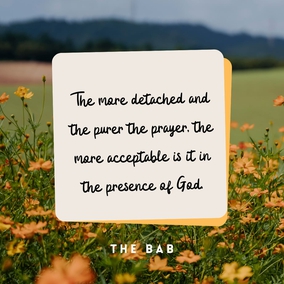
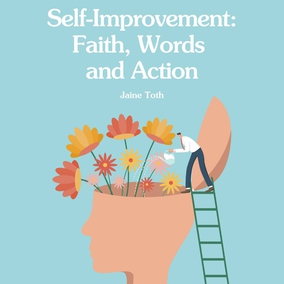

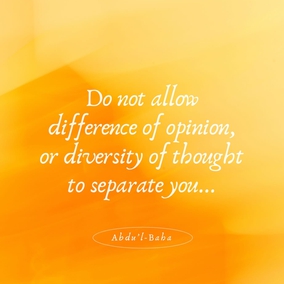
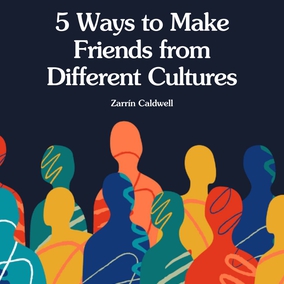
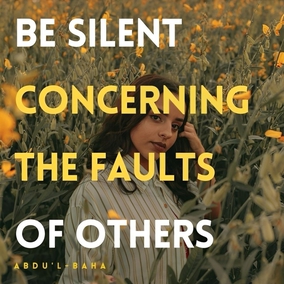



Comments
Sign in or create an account
Continue with Googleor